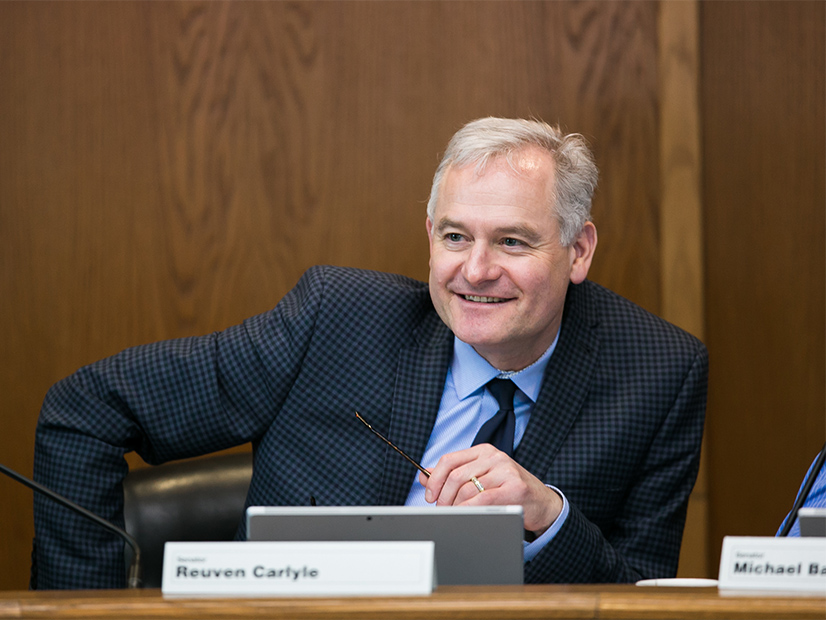The architect of the nation’s second cap-and-trade law said last week that he will leave the Washington Senate when his term expires next year.
On Jan. 24, Sen. Reuven Carlyle (D) announced that he won’t run for re-election later this year. “I have a deep sense of fulfillment. … It’s time for me to open a new chapter of my life. … I’m taking the luxury of going out on top,” he said Tuesday in an interview.
Carlyle is chairman of the Senate Environment, Energy and Technology Committee. Along with Rep. Joe Fitzgibbon (D), chairman of the House’s Environment and Energy Committee, he is one of the state’s top two legislators on climate change issues.
Carlyle represents an upscale, north-central Seattle district in the state legislature.
In the interview, Carlyle said he has achieved most of what he wanted in a legislative career dating back to 2009 and is ready to tackle something else.
Carlyle pointed to the 2021 passage of Washington’s Climate Commitment Act, which implements a cap-and-trade program in the state, as a crowning achievement of his legislative career. (See Wash. Becomes 2nd State to Adopt Cap-and-trade.)
Washington has the nation’s second cap-and trade program behind California. It took several years for Carlyle to get this legislation passed after first facing a hostile Republican-controlled Senate and then opposition from moderate Democrats in swing districts when his party took over the Senate in 2018.
“We won the Super Bowl of climate activities. … I’ve given it everything I have,” he said.
The 2021 law requires the Washington Department of Ecology to create system by 2023 to set the state’s total industrial carbon emissions annually, a cap that slowly decreases through the years. Large polluters would submit bids in the state quarterly auction for allowances enabling them to emit greenhouse gases within a year’s overall limit. Companies would be allowed to trade, buy and sell the allowances.
Under the law, an environmental justice panel will be appointed to ensure that low-income neighborhoods and communities of color would not be disproportionally burdened with excess pollution. The state anticipates the auctions would raise $500 million annually that the state can allocate to those areas.
The program would cover facilities that emit 25,000 metric tons or more of GHGs annually. There are at least 100 such facilities in the state, including the oil, cement, steel and power industries and large food processing plants.
Carbon emissions have been blamed for negative health impacts; increased wildfires; changing snowpack melt patterns in the Cascade Range, which translates to streams not feeding irrigated farms at the proper times; and creating acid rain that destroys the shells of baby oysters in the state’s shellfish industry. A 2018 University of Washington study said the state’s poor face additional health dangers from climate change.
In 2018, Washington’s carbon emissions totaled 99.57 million tons. An earlier law set emission goals of 50 million tons by 2030, 27 million tons by 2040 and 5 million tons by 2050.
Carlyle also spearheaded passage of a 2019 law that will eliminate coal-fired electricity in Washington by 2025, require all retail electricity in the state to be carbon neutral by 2030 and require 100% of its retail electricity to come from sources other than those that emit greenhouse gases by 2045.
Along with setting new low-carbon fuel standards and advancing other climate bills in 2021, “we have passed the strongest suite of climate change legislation in United States history at the state level,” Carlyle said.
No Lobbyist
Climate change was not high on Carlyle’s priorities when he joined Washington’s House of Representatives in 2009, where he eventually became chairman of the Finance Committee, which handles tax and revenue issues. Carlyle credited his conversion to his three daughters and one son — currently ages 15 through 24 — as influencing him to consider climate change as the major focus of his legislative career.
He moved to the Senate in 2018, the same year that Democrats assumed control of that chamber.
Other Carlyle accomplishments include improvements in foster care, making the value of a corporate tax break public information and easing the transfers of students from two-year to four-year colleges. He is proud to be one of seven senators to vote against exempting the legislature from Washington’s public records law. Gov. Jay Inslee vetoed that legislation.
Carlyle’s biggest unfulfilled wishes are eliminating the death penalty and bolstering the state’ data privacy laws — efforts that have passed the Senate but have stalled in the House. He has also unsuccessfully tried to pass a bill for years to require a one-year cooling off period between when a legislator or state official leaves office and becomes a lobbyist.
His day job is being a high-tech entrepreneur and business consultant in the wireless, software and clean energy industries. He plans to keep active in local, state and federal civic affairs, but he does not know what he will tackle next. “I have no formal plans,” Carlyle said.
“I won’t become a lobbyist,” he added.



